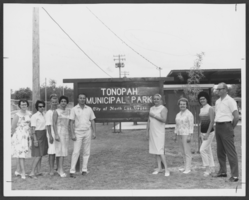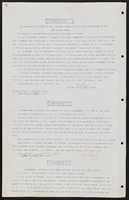Search the Special Collections and Archives Portal
Search Results
Katherine L. Rankin oral history interview
Identifier
Abstract
Oral history interview with Katherine L. Rankin conducted by Claytee D. White on June 16, 2014 for the Boyer Early Las Vegas Oral History Project. In the interview, Rankin discusses her childhood, her move to Las Vegas, Nevada, and her career as a librarian. Rankin talks about how she began her library career on the Gila River Reservation in Arizona before accepting a position as an audio and visual materials cataloger at University of Nevada, Las Vegas (UNLV) in the 1970s. Rankin later describes her work with the American Library Association, getting tenure at UNLV, and her role as a map cataloger in UNLV Special Collections and Archives.
Archival Collection
Jeffery Silver oral history interview
Identifier
Abstract
Oral history interview with Jeffery Silver conducted by Claytee D. White and Stefani Evans on November 14 and 25, 2024 for the Boyer Early Las Vegas Oral History Project. In this interview, Silver recalls his childhood in Beverly Hills, California before his family relocated to Las Vegas, Nevada when Silver was in the fourth grade. His father worked with Tony Cornero at The Stardust Hotel and the family lived in a Francisco Park duplex. Silver attended various local schools, eventually graduating from Las Vegas High School in the same class with Bruce Woodbury and Gardner Jolley. Silver graduated from Northwestern University with an accounting degree, and attended the University of San Diego School of Law. Upon returning to Las Vegas, he joined the accounting firm Laventhol and Horwath (L&H), and at age 22 became Nevada's youngest person to pass the Certified Public Accountant (CPA) exam. Governor Mike O'Callaghan appointed Silver to the Nevada Gaming Control Board, a position that utilized his legal and accounting expertise. In two interview sessions, Silver describes his legal career with the firm Lionel Sawyer Collins, Nevada's North/South power struggle, his relationship with Oscar Goodman, The National Museum of Organized Crime and Law Enforcement (The Mob Museum), his work at The Landmark (1979-1983) during the Wolfram/Tickel era of ownership, his work at the Riviera (ca. 1983-1984) under owner Meshulam Riklis, his short stint at Caesars World (1984), and his various law partnerships over his 50 years of practice. Digital audio and photographs available; no transcript available.
Archival Collection

Photograph of North Las Vegas Women's Club, North Las Vegas, July 22, 1965
Date
Archival Collection
Description
Image
Vegas PBS Interviews for the African Americans in Las Vegas: a Collaborative Oral History Project
Identifier
Abstract
Oral history interviews with Ruby Amie Pilot, Eva G. Simmons, Melvin Sanders, Jarmilla McMillan-Arnold, Hannah Brown, Sonny Thomas, and Claytee White conducted by Vegas PBS on April 01, 2013, April 02, 2013, April 12, 2013, and November 19, 2013 for the African Americans in Las Vegas: a Collaborative Oral History Project. In these interviews, the participants discuss their early lives and moving to Las Vegas, Nevada. Pilot talks about segregation on the Las Vegas Strip, integration, and the importance of church activities in the African American community. Simmons describes her career as a teacher, the schools on the Westside, and businesses on Jackson Street. Thomas describes the funeral industry and his role as a funeral director. McMillan-Arnold talks about segregated Las Vegas, African American entertainers, and the issue of homelessness on the Westside. Brown remembers growing up on the Westside, segregated schools, and her role as President of the National Coalition of 100 Black Women – Las Vegas chapter. Lastly, Sanders discusses his childhood in Las Vegas, being the son of a preacher, and the redevelopment of the Westside.
Archival Collection
D. D. Cotton oral history interview
Identifier
Abstract
Oral history interview with D. D. (Ethel Dolores) Cotton conducted by Claytee White on February 14, 1997 and March 21, 1997 for the Women's Research Institute of Nevada (WRIN) Las Vegas Women Oral History Project. In this interview, Cotton discusses the beginnings of her dance career in New York City, New York. Later in the interview, Cotton discusses working in Las Vegas, Nevada at the Cotton Club and her interactions with other African American entertainers. Cotton also discusses race relations and her experiences as an African American dancer in Las Vegas. Cotton later goes on to discuss her career change in the service industry.
Archival Collection
H. Edward (Eddie) Anderson oral history interview
Identifier
Abstract
Oral history interview with Eddie Anderson conducted by Dennis McBride on October 11 and 14, 2000 for the Las Vegas Gay Archives Oral History Project. Anderson speaks about his role in advocating for LGBT rights, specifically his participation in the various political and social movements during previous decades. Additionally, Anderson speaks about his experiences and involvement with the Democratic Party and the various individuals and political figures who assisted with his cause.
Archival Collection
Series I. Archived websites, 2017 to 2018
Level of Description
Scope and Contents
The series is comprised of archived captures of websites and social media sites related to the October 1, 2017 mass shooting that occurred at the Route 91 Harvest Festival in Las Vegas, Nevada. UNLV Libraries Special Collections and Archives staff selected websites that represent immediate news coverage of the event from established and alternative news media. The majority of content on these sites is comprised of articles and news stories from local, national, and international news media outlets. Established news media sources include the
Archival Collection
Collection Name: Web Archive on the October 1, 2017 Shooting in Las Vegas, Nevada
Box/Folder: N/A
Archival Component
J. D. Smith oral history interview
Identifier
Abstract
Oral history interview with J. D. Smith conducted by Albert Hewitt on October 31, 1979 for the Ralph Roske Oral History Project on Early Las Vegas. Smith begins by discussing his move to Las Vegas, Nevada in 1927 after buying an office for his dental practice. He describes life in Las Vegas at the time, how the city has expanded and changed, and his career as a dentist. Smith also talks about his time as president of the Nevada State Board of Education. He concludes by elaborating on other aspects of Las Vegas history, such as the crash of Carole Lombard's plane, the Helldorado Parades, and nuclear weapons testing.
Archival Collection
Ray M. Cutright oral history interview
Identifier
Abstract
Oral history interview with Ray M. Cutright conducted by himself on April 22, 1981 for the UNLV University Libraries Oral History Collection. Cutright talks about his experiences in operating a boat that carried both tourist passengers and workers to and from the site of the Hoover Dam. He also discusses a few specific experiences, including what it was like navigating the river.
Archival Collection

